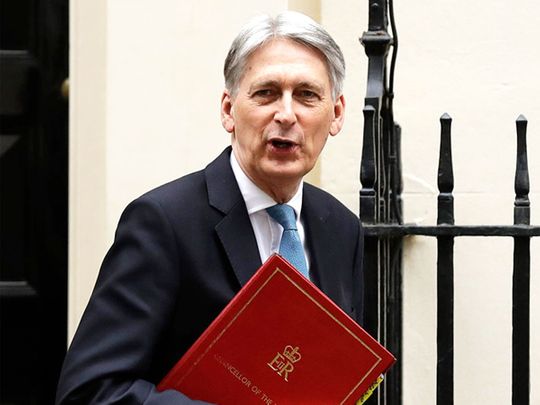
The charge of the Light Brigade has been immortalised by the poet Alfred Lord Tennyson — a valiant and brave dash into the Valley of Death. It’s a heroic image that springs to mind this week, an apt metaphor of the necessity to take brave action despite the consequences, when it seems as if Britain is racing head on towards a no-deal Brexit.
And in the heat of this political conflagration that has devoured that nation, decimated its leadership, divided its ranks, blown careers asunder and bayoneted reputations, up steps Philip Hammond. The Chancellor of the Exchequer under Theresa May — a man mockingly referred to as “Spreadsheet Phil” by his erstwhile colleagues — has led the charge of 21 rebel Conservatives in crossing party lines, turning back the big blue tide of hard-right Brexiteers, disarming Boris Johnson in a single swoosh of sanity’s sword and inflicting a telling wound on the new prime minister.
As the man who looked after Britain’s finances, Hammond perhaps is more acutely aware than all others of the true cost to the nation of a no-deal Brexit. As a Remainer, he understands too the value in maintaining a close, working relationship with Brussels and the EU27.
And there was but one choice — reject the prospect of a no-deal Brexit. Or, as he described it, put nation before party.
In doing so, Hammond has lost the membership of the Conservative party he carried since a teen old enough to understand the ethos of a party that believes everyone should stand on their own two feet — and be helped if they can’t.
Boring but bright
For years, he has been dubbed the personification of a boring accountant whose ideal holiday was a calculator and a spreadsheet.
But friends dating back to Hammond’s days at Shenfield High School in Essex during the 1970s recall a longhair teenager who, with a twinkle in the eye, drove fellow sixth-formers to the pub for lunch.
It was the era of 1970s Glam Rock and Hammond launched a highly successful career as an entrepreneur by running discos. After reading politics and economics at Oxford he made a mint in residential and commercial building in the 1980s and 1990s.
The Hammond fortune, which gave him the keys to a smart Jaguar car, allowed him to fulfil the Michael Heseltine criterion to ensure success in politics.
He entered Parliament at the relatively late age of 41 in 1997 as a millionaire, ensuring he would not be beholden to anyone.
Former school friends paint a picture of a highly intelligent teenager who had the confidence to challenge, in a friendly way, his left-wing history teacher.
Fellow-pupil Richard Madeley, now a television presenter, recalls: “He would always finish his work in class ahead of everybody else. He was very, very bright. And then he put his big boots on the desk and start reading the Daily Telegraph and swapping political dialogue with our history teacher who was a Guardian reader. And usually towards the end of the class they would swap papers and then they would sort of score jolly points off each other making political points.”
Hammond, ironically, began his studies October 10, 1974 — the same day that Labour’s Harold Wilson won the General Election.
Flashes of humour
After graduating with first class honours he went on to work as a management trainee before setting up a string of his own businesses. In 1984 he cofounded Castlemead Ltd — a health care and nursing company which has since netted him a reported £8 million (Dh42 million), making him one of Britian’s richest MPs. He has also earned a fortune working as a consultant, and in the mid 1990s advised the government of Malawi.
Hammond married his wife Susan Williams-Walker in 1991, who is also a co-director of Castlemead.
The pair met when Williams-Walker was an Conservative election agent and now have three children — Amy, Sophie and William. She has been described as “glamorous and fun, with a good sense of humour”. She has chaired the Parliamentary Palace of Varieties in aid of Macmillan Cancer Support and regularly organises “other half parties” for MPs’ partners.
For now, Hammond’s Conservative party is backing his as their candidate if and when the House of Commons votes to call a general election. According to Downing Street, the 21 rebels have been de-selected — meaning they cannot run as Conservative candidates.
His political legacy is assured: He hasn’t the left the Conservatives. It is they who left him — for now.
— With inputs from agencies










